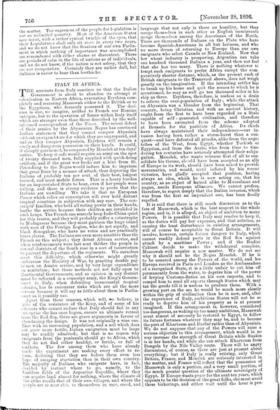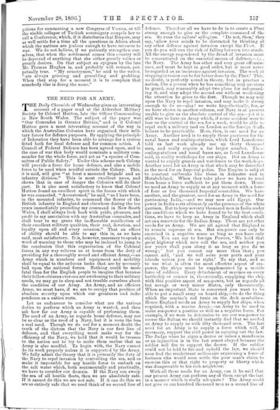ITALY IN AFRICA. T HE accounts from Italy convince us that
the Italian Government is about to abandon its attempt at colonisation in Eastern Africa, evacuating Erythrea com- pletely and restoring Massowah either to the British or to the Egyptians, who formerly possessed it. The deci- sion is due, we imagine, neither to French nor Russian intrigue, but to the operation of forces within Italy itself which are stronger even than those described by the well- informed correspondent of the Times. The recent defeat ef their armies by the Abyssinian Negus has convinced Italian statesmen that they cannot conquer Abyssinia ithout an expenditure for which they are unprepared, and unless they conquer Abyssinia, Erythrea will remain a costly and dangerous possession on their hands. It could, if cheaply garrisoned, be conquered by Menelek at ten days' notice. To keep it safe would require an army on the spot of twenty thousand men, fully supplied with quick-firing artillery, and if the great war broke out a hint from St. Petersburg to the Negus would induce him to imprison that great force by a menace of attack, thus depriving the Italians of probably ten per cent. of their best, longest trained, and most mobile forces. That is a heavy burden for an impoverished State to bear, even if her people were willing, and there is strong evidence to prove that the Italians are unwilling. We take it that no European Power which relies on conscription will ever hold distant 'tropical countries in subjection with any ease. The con- scripts' families, who hold all voting power in their hands, loathe the service because their children are invalided in such heaps. The French can scarcely keep Judo-China quiet for this reason, and they will probably suffer a catastrophe in Madagascar because they must garrison the huge island with men of the Foreign Legion, who do not signify, and black Senegalese, who have no votes and are practically brave slaves. The Italians are even more sensitive than the French on this subject ; they detest African service, and when reinforcements were last sent thither the people in several districts of the South rose in a sort of insurrection to prevent the departure of the regiments. 'We ourselves meet this difficulty, which otherwise might greatly mbarrass the Ministry of War, by granting double pay to men on Asiatic service, and by very large expenditure D a sanitation ; but those methods are not fully open to Continental Governments, and as opinion in any district must be reflected in a conscript army, the King's Govern- ment in Italy, when defending unsuccessful tropical rolonies, has to encounter risks which are all the more ,erious because it will say as tittle about them in Parlia- ment as it possibly can.
Apart from these reasons, which will, we believe, in ipite of the resistance of the King, and of some of his advisers who cannot endure that Italy should fail in any ent,rprise she has once begun, ensure an ultimate retreat trom the Bed Sea, there are grave arguments in favour of abandoning the design. It was not originally a wise one. That with an increasing population, and a soil which does not grow more fertile, Italian emigration must be large may be readily admitted ; but that is no reason why emigrants from the peninsula should go to Africa, which they do not find either healthy, or fertile, or full of markets. The few among them who have already made the experiment are making every effort to re- turn, declaring that they see before them even less hope of escaping starvation than in their own country. The majority of Italians who emigrate have, in fact, decided by instinct where to go, namely, to the lunitless fields of the Argentine Republic, where they can acquire land almost for nothing, where the climate of the cities recalls that of their own villages, and where the people are so near akin to themselves in race, creed, and languige that not only is there no hostility, but they merge themselves in each other as English immigrants merge themselves among the Americans of the North. There are thousands of Italians on the Plate who have become Spanish-Americans in all but laziness, and who no more dream of returning to Europe than our own emigrants who select Canada or New Zealand. Now that her wheat industry is prospering, Argentina can take one hundred thousand Italians a year, and then not feel that she has too many. There is nothing whatever tc tempt such emigrants to prefer Africa except the com- paratively shorter distance, which, as the present rash of British emigrants to the Transvaal shows, does not weigh greatly on the imagination. If the intending settler has to break up his home and quit the scenes to which he is accustomed, he may as well go ten thousand miles in his ship as three. Erythrea, therefore, is useless as a drain to relieve the over-population of Italy ; while the attack on Abyssinia was a blunder from the beginning. That country, being Christian and with an ancient history, ought from the first to have been regarded as a State capable of self - generated civilisation, and therefore to have been exempted from the scheme adopted at Brussels for the partition of Africa. Its chiefs have always maintained their independence—our in. vasion having been rather a storm-burst than a con- quest—and have defeated all attacks, alike from the negrc tribes of the West, from Egypt, whether Turkish or Egyptian, and from the Arabs, who from time to time during ten centuries have seriously attempted their au*. gation. Menelek, who wants revenue first of all to con- solidate his throne, should have been accepted as an ally of Europe in its work, should have been asked to provide mercenaries, and would, until inflated by his recent victories, have gladly accepted that position, having always an idea, which he is now acting on, that his country, as an object of hatred alike to Mussulman and pagan, needs European alliances. We cannot profess, therefore, to regret deeply that the Italian invasion, which was from the first an imprudent one, has been finally repelled. It is said that there is still much discussion as to the fate of Massowah, which is the best seaport in the whole region, and is, it is alleged, an object of ambition to many Powers. It is possible that Italy may resolve to keep it, as the duties will pay her expenses, and that solution, as causing the least disturbance in existing arrangements, will of course be acceptable to Great Britain. It will involve, however, certain future dangers to Italy, which cannot readily defend ports in the Red Sea against attack by a maritime Power ; and if the Rudini Cabinet decide to make the withdrawal complete, Massowah will require a new master. We do not see why it should not be the Negus Menelek. If he is to be counted among the Powers of the world, and his Envoys received in Paris and London as the Ambassadors of a recognised State, it is a little unfair to cut him off permanently from the water, to deprive him of the power of levying Customs-duties on his own imports, and to compel him to send all exports through States which may tax the goods till it is useless to produce them. With a growing port on the sea he would be much more closely within the grip of civilisation than he is now, and, after the experience of Italy, ambitious States will not be so ready to deprive him of his property as is at present imagined. If this arrangement is, however, considered too dangerous, as waking up too many ambitions, Massowah must almost of necessity be restored to Egypt, to follow its future fortunes whatever they may be, and to become the port of Khartoum and Darfur rather than of Abyssinia. We do not suppose that any of the Powers will raise a serious objection to this arrangement, which would in no way increase the strength of Great Britain while Suakin is in her hands, and while she can attack Khartoum from Dongola by the Nile Valley route. There will be angry discussions, of course, as there are just at present about everything; but if Italy is really retiring, only Great Britain, France, and Menelek are seriously interested in the matter, and France will reflect that the possession of Massowah is only a portion, and a very small portion, of the much greater question of the ultimate sovereignty of Egypt If Europe wants peace for the next ten years, which appears to be the decision of the great folks, she must avoid these bickerings, and either wait until the hour is pro- P itious for summoning a new Congress of Vienna, or till the visible collapse of Turkish sovereignty compels her to call a Conference, which, if it distributes that Empire, may as well settle for a time all the questions in Africa about which the nations are jealous enough to have recourse to war. We do not believe, if we patiently strengthen our- selves, that when the settlement comes this country will be deprived of anything that she either greatly values or greatly desires. On that subject an epigram by the late Mr. Thomas Hughes is, and probably will remain, per- petually true. "My countrymen," he said to the writer, "are always grieving and grumbling and grabbing. When they stop for a moment it is to complain that somebody else is doing the same."











































 Previous page
Previous page